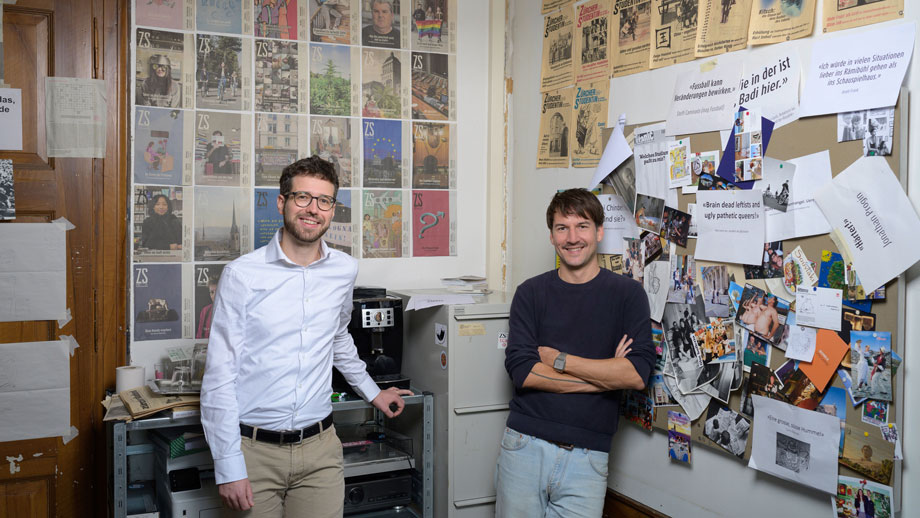“There’s always a bit of madness involved”

Congratulations on your very nicely done anniversary book. When reading the history of the newspaper in your book, it seems like a miracle that the ZS still exists. Its existence was often precarious and called into question. You both worked as editors for the newspaper for several years. What’s the secret behind the longevity of the Zürcher Studierendenzeitung?
Johannes Luther: There are probably various factors, and sometimes there was also luck and randomness at play. In the first decade after the newspaper was founded, there was a point where it almost went into liquidation. However, a procedural error prevented this from happening. But the true lifeblood of the ZS has always been idealism. Young people keep coming together and saying: we’re going to publish this newspaper, and we’re going to do it despite all the obstacles.
Michael Kuratli: The good thing is that no one is dictating what the newspaper has to look like or what its scope or distribution should be. In the future it could just be a website. It could’ve just been a photocopied leaflet. The people who work on the paper decide how much effort to put into it. What’s kept the ZS alive, in addition to idealism, is that everyone who has carried the baton didn’t want to see the paper go down on their watch. This is a big motivator that I also felt myself. You were always aware of the fact that Max Frisch and Annemarie Schwarzenbach also wrote for the paper. You come into the editorial offices at Rämistrasse 62, where time stands still, and you feel that you’re part of something bigger. Maybe it’s this feeling that keeps us going. You manage to leave your mark once you’ve spent a few years on staff. Ideally without ruining anything in the process.
Your book makes the history of the paper sound like a heroic journey through a centenary which included a world war, youth revolts and a whole lot of crises – both internal crises and those provoked by external enemies. During this journey, the ZS is always teetering on the edge, and you never know if it’s going to make it. When you look back, what were the most important milestones and turning points?
Luther: In the beginning, just surviving was already an achievement. Before the ZS was founded in 1923, there’d been various attempts to set up a student paper, but they were all short-lived. The next hurdle was to survive the period around 1930, when two Swiss Frontists – Hans Vonwyl and Robert Tobler – held the post of editor-in-chief back to back. After 1968, the ZS became left-wing and socially critical. In the 1980s, the paper acted as a mouthpiece for the youth movement and was renamed from “Zürcher Studenten” to “Zürcher Student/in” or “Zürcher Studentin” to include female students. Since 2007, the paper has gone by the name of “Zürcher Studierendenzeitung”.
Kuratli: The turn to the left with the 1968 movement is the most important political and ideological turning point of the ZS. The paper has been in the leftist camp ever since. At times it has been decried as a radical left-wing newspaper. Even during my tenure from 2012 to 2016, we were often accused of being too left-wing. And of course this is true: for over half of its existence, the ZS was left-wing and associated with left-wing organizations because they were the ones that somehow kept the student movement alive. This is in contrast to the bourgeois factions who wanted to abolish everything organized by students. In addition to the turning points ideologically and content-wise, there were financial turning points as well. One particularly harsh existential threat was the abolition of the constituted student body of the University of Zurich (SUZ) in 1978. This meant the newspaper no longer had a financial base, as the editorial offices had been funded by the membership contributions of students. This kicked off the financial crisis mode in which the newspaper basically constantly operated until its relaunch in 2007.
Conflict is one of the constants in ZS history. In fact, you even included this in the title of your book: 100 Years of Conflict (“100 Jahre Zoff”). You mainly have the conflicts in mind that were started by the ZS, in line with the motto “provocation is the best weapon against irrelevance”, as you wrote in the foreword. It was often the other way around as well: the paper faced repeated attacks. So what was it: were the fights a magic potion, or were they also life-threatening for the newspaper?
Luther: It was important that ZS never allowed itself to be censored. It enjoyed being provocative and engaging in polemics. The main conflict was that the ZS sometimes wrote things that were contrary to its own interests, for example when writers attacked advertisers with critical articles. The Government Council of the Canton of Zurich, the Executive Board of University and student organizations of course faced criticism, even though they were important for the survival of the paper. So we were never cowardly or submissive. A significant part of the conflict was also internal. There have been countless editorials that posed the questions: “What kind of paper do we want to be? Why aren’t we read more widely? We need to acquire new readers. We need to become more relevant.” We always asked ourselves: Who exactly is reading us? The mothers of students who have the paper sent to their homes? Is that our target audience? But at other times the audience was quite clearly the university community. Then we would get attacked from inside UZH and ETH. For example, with photos that showed people setting the newspaper on fire or putting it on the barbecue with the statement: “This is how to use the ZS.”
Kuratli: The long history of ZS gave us the courage to be cheeky and to question things. Because you knew that it wasn’t possible to simply kill the paper – it had already lived through worse crises, so it will certainly survive another one. Another factor was that we didn’t really have to be accountable to anyone. A university is like a small country, and we saw it as our mission to act as the press within this country, highlighting and being critical when things go wrong. Of course this always makes people angry.
Luther: During my tenure, for example, we were critical of the creation of the University of Zurich Student Association (VSUZH) in 2012-2013 and pointed out that only around half of the students were members. This raised the question of how much backing the organization actually had. The second point of critique was whether the VSUZH was primarily preoccupied with partying. We had a headline in the ZS that read “To hell with politics! We just want to party”. The VSUZH came back at us with the rejoinder: “Stop constantly attacking us. We both want the same things.”

The sofa in the editorial room is not only famous because it’s so scruffy, but also because it’s witnessed so much.
Earlier we touched on the heroic journey that the ZS has made over the past century. Some of the articles in the book convey the feeling that simply publishing the newspaper is heroic in itself. What was your experience with this?
Luther: I remember not getting a lot of sleep. During production week, we were all crammed together in this small room making the newspaper. Sometimes you were awake until the wee hours of the morning poring over an issue. A certain amount of aggression could get pent up during this time. We always did the headlines on Sunday. Everyone was standing around one monitor, and we went through every article, discussing and deciding on headline for each one. And then inevitably someone would shout, “No one’s gonna read it anyway!” Once the paper was finally sent out to the printer, a great burden was lifted, and everyone was extremely tired.
Kuratli: The image of a heroic journey isn’t bad at all. You set off on a journey, there are so many obstacles and you’re trying to accomplish something, in this case publishing a newspaper. Then there is an intense celebration to mark the catharsis, which you can see here with all of the stacked up beer cans. And then finally holding the printed final copy of the paper in your hands is something special, because it’s volunteer work that requires a huge investment of energy. There’s this absurd pathological perfectionism that manifests here, with people obsessing over and polishing the texts for hours. There’s always a bit of madness involved in producing this newspaper.
The ZS editorial team is a motley mix of people. How was the chemistry between everyone during your tenure?
Luther: In the core editorial team there were between five and nine people. There was a certain amount of friction, also because there were a lot of strong personalities coming into contact with one another. There was strong cohesion as well. We noticed this when we were looking for authors for the book project. Almost everyone said yes. Friendships were also made during this time. Michael and I got to know each other while serving on the editorial team.
Kuratli: An important part of my group of friends comes from the time I spent at the ZS. Over the years there were also countless love affairs and relationships that arose among the staff. The sofa in the editorial room is not only famous because it’s so scruffy, but also because it’s witnessed so much. Good that it gets replaced every few years.
What motivated you to work for ZS?
Luther: I started studying in Zurich and didn’t know anyone at UZH. I knew that I wanted to do something with journalism. At freshman orientation, the ZS editorial team were handing out flyers and said, “Come to the next editorial meeting.” I showed up and never really left. I didn’t end up becoming a journalist like Michael but I did learn a lot, like how to write an article and what it means to work on an article with a lot of passion.
Michael Kuratli, you became a journalist. What was your motivation? Did you see the ZS as an introduction to your journalism career?
Kuratli: No, not at all. I wasn’t thinking about journalism at all when joining. I used to know the editor-in-chief of the paper. He raved about it all the time. So I attended a meeting and wrote an article. And then for a long time I didn’t do anything. But as time went on, my work on the newspaper staff made me a lot happier than my actual studies. In that way, my time on the paper saved my student days.

It was important that ZS never allowed itself to be censored. It enjoyed being provocative and engaging in polemics.
A lot of former ZS staff members work in the media today. One of the arguments for writing for the ZS is that it’s a great introduction to a career in journalism. Is that true?
Kuratli: Here you can learn how to publish a newspaper from A to Z. You also learn how to intensively deal with texts. Not only with your own, but also as an editor you frequently encounter very poorly written articles from freelancers. For a lot of them, it’s their first time writing an article, like it once was for me. You then have to turn it into something usable. In this way, you learn how a well-written article works. This is an incredibly essential part of the job that you don’t learn in journalism school as such. In parallel you study something with substance, which allows you to engage with the world on an intellectual level. This combination is a good prerequisite for being able to make it in journalism.
Where does the ZS stand today? In the book there is a contribution by the current editorial team in which they claim to be “working their asses off” for an idea, or that the ZS aims to be “the world’s best newspaper” and “the most exciting student paper in the universe” – not exactly a paragon of modesty. Does the paper in its current form live up to these standards?
Luther: I still read the ZS regularly. It seems to be even more left-wing, environmentalist and feminist than we were. It also seems to be more aware of the problems facing us in the current era. The ZS tries to speak out seriously on important topics. This is something that young people need to do as well. The challenges are enormous, after all.
Kuratli: Yes, it’s true that the ZS does serious journalism. This mission is something I connect with the relaunch in 2007. Before that, the “Zürcher Studentin” was a very progressive publication, but journalistically insignificant. Student involvement and cohesion among the student body were more important priorities back then. In 2007 the ZS and the iQ, the more mass-market offshoot of the media club, merged together. After that, the paper was less ideological, and journalistic quality became more important. You can see this from the awards it’s won: the ZS has now received the Pro Campus Presse Award for the best German-language student paper three times. There have also been prizes awarded for individual stories. The current staff are putting out a very professional and punchy paper. It’s impressive.
Will the ZS exist 100 years from now?
Luther: I hope so. The paper has already survived so many crises. What it would look like at that time, though, is unclear.
Kuratli: After so many years, I don’t think the ZS will go under. Whether it survives as a printed paper, an Instagram account or whatever the future brings, the tradition will live on. For that reason, I believe that the ZS will one day celebrate its 200-year anniversary.
This article is published in German in UZH Magazin 4/2023.